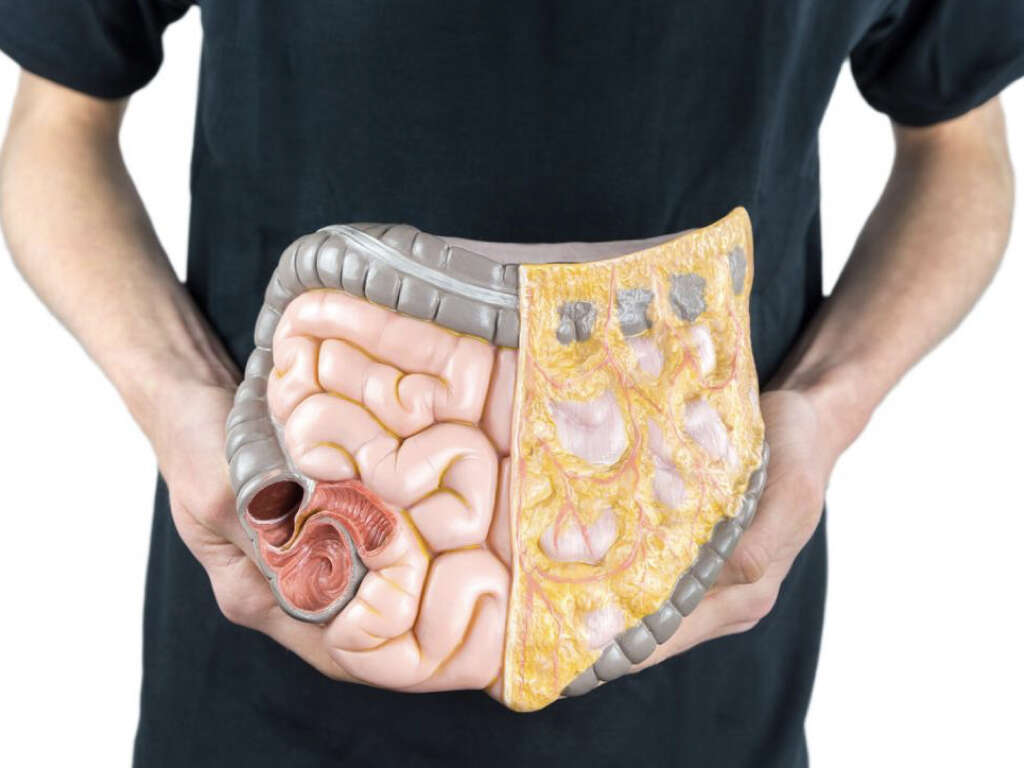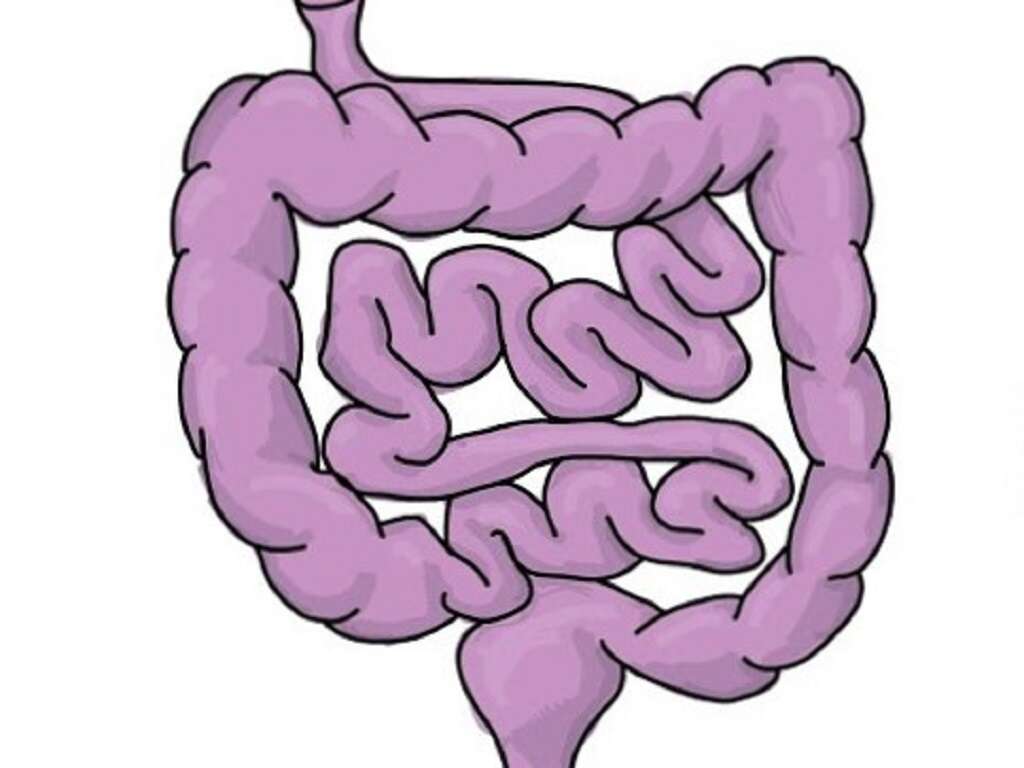Ileus Symptoms, Causes & More
 Article Sources
Article Sources
- 1. ’Intestinal obstruction.’ Mayo Clinic. www.mayoclinic.org/diseases-conditions/intestinal-obstruction/diagnosis-treatment/drc-20351465
- 2. ’Intestinal obstruction and ileus.’ Medline Plus. www. medlineplus.gov/ency/article/000260.html
- 3. Vilz T; Stoffels B; Strassburg C’Schild H; Kalff J. ‘Ileus in Adults.’ National Institutes of Health. www.ncbi.nlm.nih.gov/pmc/articles/PMC5569564
Ileus is an umbrella term that refers to a blockage in the intestine, and it may occur in either the small intestine or the colon. There are two types of ileus, functional and mechanical.
A functional ileus obstruction is caused by the slowing down of the bowel's smooth muscle, causing food to back up. It may be caused by nerve damage induced by diabetes or muscle and nerve disorders, such as Parkinson's disease. Opioid usage may be a culprit as well. Mechanical ileus may develop due to scarring after abdominal surgery or narrowing of the bowel due to inflammatory conditions, such as Crohn's disease.1’Intestinal obstruction.’ Mayo Clinic. www.mayoclinic.org/diseases-conditions/intestinal-obstruction/diagnosis-treatment/drc-20351465

Ileus Symptoms
Symptoms in ileus may vary depending on the location of the blockage. A distended abdomen and a feeling of fullness are common first signs. Pain and cramping may follow, along with constipation or diarrhea. As the obstruction progresses, the person may not be able to pass gas.
Foul breath odor may be noticeable with ileus, while nausea and vomiting may occur as the obstruction keeps food from progressing through the digestive system. The stomach may become very quiet and signs of movement in the bowel may cease. As the condition worsens, pain may become unbearable.2’Intestinal obstruction and ileus.’ Medline Plus. www. medlineplus.gov/ency/article/000260.html

Ileus Causes
The two types of ileus have different causes. Mechanical ileus is caused by structural problems that prevent food from passing through the bowel. Scar tissue and fibrous bands may press on the bowel walls from outside, obstructing movement inside. Walls thickened by inflammation may also slow or stop progression of food.
Functional ileus arises from nerve or muscle problems that inhibit the bowel's movement. Diseases that affect nerves, such as Parkinson's and diabetes, may interrupt the brain's impulses that facilitate the bowel's activity.1’Intestinal obstruction.’ Mayo Clinic. www.mayoclinic.org/diseases-conditions/intestinal-obstruction/diagnosis-treatment/drc-20351465

Ileus Risk Factors
A common risk factor for mechanical ileus is prior abdominal surgery that causes adhesions and scars. Another is Crohn's disease, where inflammation causes thickened bowel walls. Diverticulitis that causes adhesions is an additional mechanical ileus risk factor, and the presence of a hernia may apply pressure as well.
Functional ileus risk factors include diabetes or metabolic conditions that change mineral content in the body, resulting in nerve damage. Obstruction of the blood vessels supplying the bowel may also lead to ileus.1’Intestinal obstruction.’ Mayo Clinic. www.mayoclinic.org/diseases-conditions/intestinal-obstruction/diagnosis-treatment/drc-20351465

When To Seek Medical Help
If the ileus doesn't clear up on its own with conservative measures such as a partial or full liquid diet, medical help may be necessary to check for certain underlying conditions. An inability to pass stool or gas and a swollen abdomen are two common symptoms of advancing ileus.
Continuous vomiting and unexplained abdominal pain are two other symptoms that can point to a potentially serious blockage that may lead to complications. These should be reported to a person's doctor and investigated immediately.2’Intestinal obstruction and ileus.’ Medline Plus. www. medlineplus.gov/ency/article/000260.html

Ileus Diagnosis
After a discussion of the person's medical history and a review of symptoms, including severity and duration, a physician may press on the abdomen to find the location of the ileus. Listening to the stomach with a stethoscope may reveal whether food is moving through.
An abdominal X-ray is typically one of the first tests performed, alongside some bloodwork. A CT scan or ultrasound may be completed to show more detail. Tests providing the greatest detail are a barium or air enema.1’Intestinal obstruction.’ Mayo Clinic. www.mayoclinic.org/diseases-conditions/intestinal-obstruction/diagnosis-treatment/drc-20351465 2’Intestinal obstruction and ileus.’ Medline Plus. www. medlineplus.gov/ency/article/000260.html

Possible Ileus Complications
Complications from untreated ileus are serious and must be treated as medical emergencies. If the pressure on the bowel is prolonged, tissue death may occur followed by a tear in the bowel wall, leading to infection in the abdominal cavity, which is called peritonitis.1’Intestinal obstruction.’ Mayo Clinic. www.mayoclinic.org/diseases-conditions/intestinal-obstruction/diagnosis-treatment/drc-20351465
Because of the inability of the bowel to absorb nutrients and water correctly, dehydration and electrolyte imbalance may occur. In this case, the physician may order the administration of IV fluids containing electrolytes.

Ileus in Infants & Children
Paralytic ileus is a common cause of obstructive bowel illness in infants and children.2’Intestinal obstruction and ileus.’ Medline Plus. www. medlineplus.gov/ency/article/000260.html Sometimes the ileus forms in infants because of bowel intussusception, where one section of the bowel telescopes into an adjacent section, blocking off normal digestive movement.
Typically, surgery isn't needed to correct these obstructions in children. A diagnostic barium or air enema identifies the condition and may also be used to help straighten out the bowel using pressure. If this conservative treatment is ineffective, surgery may be necessary.1’Intestinal obstruction.’ Mayo Clinic. www.mayoclinic.org/diseases-conditions/intestinal-obstruction/diagnosis-treatment/drc-20351465

Treatment of Ileus
How ileus is addressed depends on the cause. If there's a partial obstruction, a low-fiber diet, liquids and exercise may help to reduce the bulky stool, making it easier to pass. For complete obstruction, surgery may be required to remove the blockage and any damaged or dead tissue.
With colon cancer, a temporary wire mesh tube, a stent, may be inserted into the bowel, forcing the intestine to open. In pseudo-obstruction or paralytic ileus, hospitalization for one or two days may be necessary.1’Intestinal obstruction.’ Mayo Clinic. www.mayoclinic.org/diseases-conditions/intestinal-obstruction/diagnosis-treatment/drc-20351465,2’Intestinal obstruction and ileus.’ Medline Plus. www. medlineplus.gov/ency/article/000260.html

When To Operate for Ileus
The decision to operate depends on the presence of certain factors, such as abdominal pain for more than four days and a high white blood cell count. Signs of peritonitis, including abdominal pain, fever, nausea and vomiting or loss of appetite, may also be deciding factors.
A colostomy is a procedure that opens the bowel to the skin, necessitating a bag to collect waste. It may be used in cases of peritonitis, or in an elderly person who has other diseases.3Vilz T; Stoffels B; Strassburg C’Schild H; Kalff J. ‘Ileus in Adults.’ National Institutes of Health. www.ncbi.nlm.nih.gov/pmc/articles/PMC5569564

Summary
Ileus is defined as obstruction of the small or large intestine. The obstruction may be caused by functional conditions, such as diabetes or Crohn's disease, or mechanical compression that closes off the bowel. It can occur in infants, children and adults.
How ileus is addressed depends on the cause. In some cases, it may be temporary and addressed with conservative measures at home. A person may be observed in the hospital for one or two days. Some cases may require surgery and a colostomy.











